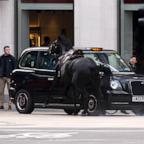Andre Agassi's powerful US Open farewell from 2006 still resonates
— -- It wasn't merely short; it was divinely concise. It wasn't merely sweet; it was heart-wrenchingly sincere. It was Andre Agassi's farewell speech, delivered on the floor of Arthur Ashe Stadium a decade ago at the US Open.
Few speeches had ever had to satisfy so intense a build-up. Over 23,000 spectators had stood showering Agassi with applause and cheers for more than four minutes before he even stepped out to address them. They stood clapping and cheering, whistling and crying out, some with tears welling in their eyes.
Taking it all in, Agassi felt that he finally understood what tennis meant in his life and what he had meant in the lives of tennis fans.
"It was my greatest moment on a tennis court," Agassi recently told ESPN.com. "And I mean it every bit the way anyone would hear or read that statement."
A decade later, the extraordinary scene that unfolded on the floor of Ashe that Sept. 3 afternoon after Agassi lost in the third-round of the 2006 US Open resonates with even greater meaning. It echoes like a fitting eulogy for perhaps the greatest generation of male tennis players ever produced in the U.S., the generation that included fellow Grand Slam champions Pete Sampras, Jim Courier and Michael Chang.
This is also the 10th anniversary of the last American male's appearance in a US Open final. One week after No. 112 Benjamin Becker of Germany stopped Agassi, Andy Roddick lost the championship match to Roger Federer.
"I guess you could call it irony," Agassi said. "Or is it tragedy?"
At the time, Agassi could not know what lean times lay ahead for the domestic game. Besides, he was too worried about his own failing condition.
Agassi was ranked No. 7 at the outset of 2006, but over the course of the year an ankle gave out, and his back threatened to follow. By the US Open, he was living in a cocoon of pain and looking hard at life after tennis. In his own mind, he thought of that portion -- two-thirds of his life, with any luck -- as, simply, "the abyss." He would have to go into it soon, but he wasn't going without a fight.
In his first match in Flushing Meadows, Agassi got by Andrei Pavel in four sets. Then he survived a five-set match with Marcos Baghdatis, mounting a spectacular rally after dropping the third and fourth sets. But Agassi was cooked. The ensuing day off still had too few hours. Agassi played a respectable match against Becker, but he was heavy-legged, dull at the edges. He lost in four sets.
Agassi knew as he walked off the court that it was time to say farewell. He had no script, but he had been thinking about this moment, and what he might say when it arrived, for months. He knew what he valued.
"My journey was less linear, more complex, less honest than most," he said. " But I knew what this game and people have meant to me, and why I had gotten through so many difficulties and achieved so much despite all else. That's why feeling connected, and communicating the value of that feeling, seemed so important."
After Becker ended Agassi's career with an ace down the middle, the loser sat with his face buried in a brilliant white towel. The standing ovation raged around and above him as he tried to compose his thoughts and control his emotions. At one point, he buried his face in his hands, and as the tears streamed down his face he tried wiping them away with the heels of his palms.
Mary Joe Fernandez interviewed Becker briefly, finally quieting the crowd. Agassi then walked out on the court and took the microphone from Fernandez. He scratched the back of his head, looked up, and spoke these words:
"The scoreboard said I lost today. But what the scoreboard doesn't say is what it is I have found. Over the last 21 years, I have found loyalty. You have pulled for me on the court and also in life. I found inspiration. You have willed me to succeed, sometimes even in my lowest moments.
"And I've found generosity. You have given me your shoulders to stand on, to reach for my dreams, dreams I could never have reached without you. Over the last 21 years, I have found you, and I will take you and the memory of you with me for the rest of my life."
The speech lasted exactly 50 seconds. Agassi made it through nearly 40 of them before his voice showed any sign of wavering or cracking. Finished, he walked to his chair like a man who had just had a thousand-pound weight lifted off his shoulders. He packed his tennis bag, but he was no longer apprehensive about his destination. He was no longer feeling uneasy about the abyss.
As he walked away, Agassi knew that he wasn't saying goodbye to the game as much as to a lot of people with whom he had been on a long and exciting journey. There would be another journey, and it too would be about people, about connections. The things that count.
"It's a bit of death of sorts," Agassi said of retiring. "You're crossing over into a different world. You can never know what to expect, what it looks like. And you don't know how you feel about it until after that day comes."
Agassi's day came, and afterward he felt pretty good about it. When he looked into the abyss, he found it filled with light and the love of 23,000 fans in Ashe and millions more who watched that day.




